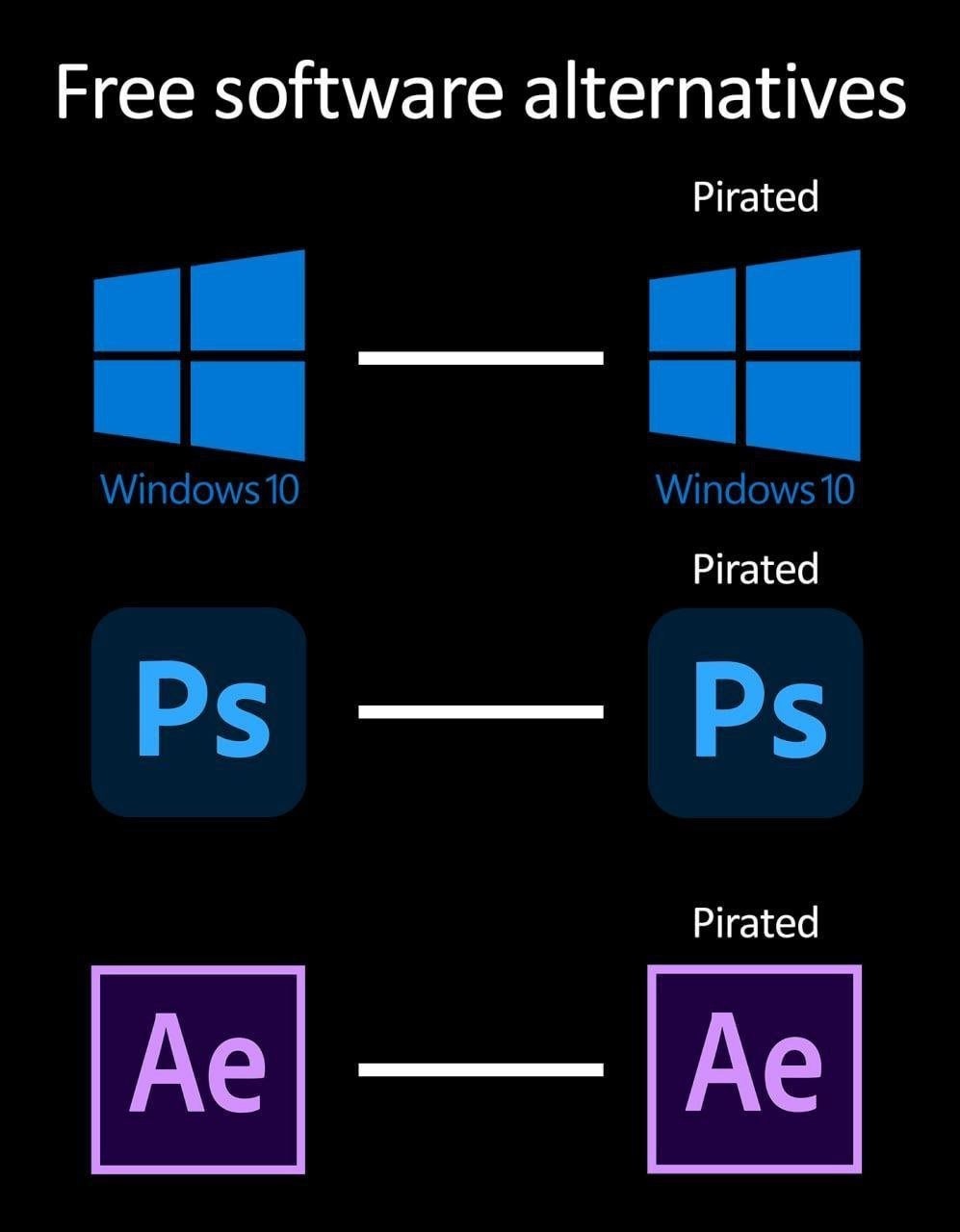- cross-posted to:
- coolguides@lemmit.online
Gimp still isn’t an effective competitor
It needs gui rework from a UI designer and is still lacking in features that creatives use
Blender is amazing though
Krita is a great program for art but I wish they’d implement full vector functionality
I’m sure for anyone who has real work to do, GIMP will hold them back compared to Photoshop.
But I grew up using GIMP and got some pretty impressive results with it. Now that I have Adobe CC access and have been using Photoshop through that, I am perpetually confused on how to do x, which I know how to do in a couple clicks in GIMP.
To be fair, I’m sure that’d go doubly so for someone who started with Photoshop since it does have an objectively cleaner UI.
I’m the opposite. I grew up pirating CS4/5/6 Photoshop but just for simple tasks. I can’t for the life of me figure out Gimp.
I’ve spent hours trying to use gimp and can’t get a dam thing done
I’ve moved on to many paid, but not subscription apps mostly from independent shops. But I’m a designer using a Mac so your results may differ.
- Photoshop -> Pixelmator Pro (Affinity Photo is ok too)
- UX -> Sketch
- Illustrator -> Affinity Designer / Sketch
- Indesign -> … I hate when someone sends me a indesign file. I don’t do book, magazine, or catalog layouts anyway. PDFs are better and I can edit them in a bunch of apps.
I do still use Autodesk Fusion for 3D hobby projects, but I’m planning to switch to Ondsel (FreeBSD) over the winter.
I’ve used both and I miss features from each when using the other. Photoshop needs numeric entry for when positioning things.
Photoshop also lacks the automation features of the GIMP which makes it feel like a toy in comparison if your workflow usually involves performing the same repetitive actions on batches of images. Like, “how can anyone stand working with this‽ Everything is so manual!”
Oh cool, didn’t know that about GIMP! I’ve always wanted something more powerful than the Action Sequencer in Photoshop. What extra can you do in GIMP?
I don’t understand why people say GIMP needs a UI rework. It seems vastly more intuitive than Blender’s UI 🤷
Don’t get me wrong: I love Blender–use it all the time for adding organic-like shapes to CAD stuff–but you can’t just sit someone down in front of the default cube and expect them to be able to get working. They’ll need a tutorial at the very least.
If you sit someone down in front of GIMP for the first time and ask them to perform common photo editing tasks they’ll have it figured out pretty quickly. Eventually they’ll get good at it. So much so that if you then take that person and put them in front of Photoshop they’ll be annoyed that they can’t follow their usually quick workflow.
Part of the problem is that 3d nodeling is unintutive in general imo. I have used both solidworks and blender and can say after learning both, they both have very steep curves (although solidworks has fun mesh rebuild errors to top everything off).
Yeah, I think you can argue for Krita, but it isn’t fully there for everything photoshop does.
I paid for Affinity Photo 2 and that does the trick for photo editing at a reasonable price. I really wish Gimp was up to it. Blender is really showing up most of the rest of that list, and of those Photoshop is where I think the biggest opportunity would be for a Blender-quality Gimp rework or alternative.
Reminds me of this:

Using pirated Adobe software these days is a much bigger pain in the ass than it was back in the day.
Those are free of price but they’re not free software (libre)
neither figma nor davinci is libre either
Calling Figma free is like calling complimentary bread sticks a full dinner.
Penpot would be a better alternative. I never used it but it’s gaining momentum.
It’s infuriating what basic features Penpot is still lacking and it trips you up all the time if you’re used to working with Figma, but what’s already in feels pretty good.
Yeah I pay Figma way too much every month for my team holy hell.
I suspect they use a different definition of “Free” than we are used to. DaVinci Resolve and Figma are not FOSS, and have free and paid levels.
I believe the others are all free (as in beer) as well as free (as in speech).
Yup, I’d also say darktable + krita is a far better solution than gimp.
That said, for pro level stuff, resolve is much better than premier in general, so it’s a solid competitor from a “Linux support” category.
Yea, Shotcut should be there.
Was going to find this cause Shotcut fits right there against Premere and AfterEffect. Supports HDR editing(ie. you can extract clips off playstation 5’s HDR video recording) but not re-encoding and export as HDR.
As a former Photoshop user, I found all the paradigms and ways of thinking in Gimp were just so utterly different from what I was used to. Simple things like cropping, resizing selections and layer management felt like exercises in frustration.
Tried Krita instead, and I’m immediately feeling at home and able to be productive straight away.
I’m sure Gimp is awesome but my brain didn’t like it. If anyone else is feeling the same way, give Krita a try.
I’ve used both Gimp and Photoshop. I’m not super skilled in any of these, but Photoshop feels the most natural to use. I’ve never figured out a good workflow for Gimp.
It’s a shame, because functionality wise Gimp is quite competent. It’s just the UI that’s crap.
It is not just you. I started using gimp and later switched to Photoshop and it was such a great productivity improvement after just a few minutes.
Try Krita too then, if you’re interested in moving to free and open source. The paradigm is very similar to Photoshop.
Krita took some adjustment for me after years of Photoshop. After I learned the workflow and keyboard shortcuts, I found that it was much better than Photoshop for painting AND completely free for life.
The fact that it’s much hyped as a painting tool was actually the reason I didn’t start using Krita earlier. Felt like it was only for artists and I’m thinking “I’m not an artist, just need to do some image manipulation” but actually, it’s fine for that too :)
That’s the weird thing about Krita: It was originally made to be a photo editor but they somehow turned it into one of the best painting tools! But there’s more!
Krita is also fantastic for vector graphics! It’s missing some of the “lower layer” features of Inkscape (e.g. metadata stuff and fine control over the generated XML/text data) but those are quickly remedied by opening your Krita-generated SVG in Inkscape for a few seconds to make the (subtle) changes you want and using it’s powerful export features.
What’s interesting is that if you do that and re-open said SVG in Krita they’ll be preserved and stay as such if you continue to modify the image. The devs did a fantastic job at that sort of thing (which, as a dev myself I know can be really hard to pull off: When you save it’s all too easy to just regenerate everything from scratch and overwrite the entire file with a completely new version, losing anything that your file exporter doesn’t normally deal with).
As a former Photoshop user, I found all the paradigms and ways of thinking in Gimp were just so utterly different
The same is true when moving the other direction.
What most people find easier is the one they learned first.
This guide is misleading. Sure, the product functionalities overlap, but if you have a mature workflow, you will not be able to switch without investing a LOT of effort in relearning your workflow on the new product stack. This is one of my MAIN reasons I hate the “I tried to switch to Linux and failed” genre of content. You’re not going to find identical like-for-like replacements in Linux world that won’t require significant effort to relearn. It’s something us Linux users through and through need to bear in mind.
Also, we need to be cognisant that “just switching to Linux” narratives, fueled off infographics like this, will lead to frustration and dismissal.
No, I don’t know how to change this - and morphing e.g. gimp to be a clone of Photoshop isn’t the answer either.
Hey now! The effort required to change workflows is how some of us have fun! Some of us derive joy in discovering new tools and new ways of doing things 😁
Think about it: How many people who switched to Linux at this point because they like learning new shit and fucking around? To them, a new tool that does something an old tool does in a new way is like being given a new flavor of ice cream to try! 🤣
It’s why old time Linux users “just don’t understand the resistance” people put up when it comes to changing apps… “WTF is your problem? If I can learn a new programming language in like two weeks surely you can learn the locations of a few new menu entries‽ I bet the new thing does stuff your old tool couldn’t do! If you just poke around you might be surprised…”
Normal people’s response: “Yeah… Fuck that. Spending that much effort to learn new things is what I call a waste of my time.”
This is such a classic Linux user response. Instead of taking the time to understand the many valid issues users have with Linux, you instead come to the same tired old smug conclusion that basically breaks down to "only smart people use Linux, like me!", and I say this as a Linux user.
Old time Linux users don’t understand why people avoid Linux because they’re not actually interested in listening and understanding peoples’ issues. Perhaps these people like learning lots of new stuff and spending hours troubleshooting, but just not with their computer. If there was a Linux equivalent of a car, it’s not hard to see why most people would just want the thing to work without bothering to become a mechanic for their car to work.
I’m sure there’s things you’ve avoided learning because you consider it to be a waste of time-- does that mean you’re unwilling to learn stuff, or would you agree that’s probably an inaccurate characterization of you? Most Linux users I’ve met are in terrible physical shape or mediocre at best. As someone in pretty decent shape, I appreciate the benefits and struggles of exercise but it’s just plain silly to basically shame others as lazy for the many reasons they could have for not exercising regularly.
I agree with your fundamental point, learning new shit is definitely fun for me. But there’s lots of different people and some just don’t. I can definitely sympathize with someone who’s income depends on one of these workflows, and why they can’t disrupt that for “fun learning sake”. There’s only so many hours in a day and some people have different priorities.
It’s not saying that it’s a drop in plug and play alternative. It’s saying it’s an alternative software to get you the same result.
Calling it a guide is misleading. It’s labeled as a list of alternatives and that’s what it is. Audio books are an alternative to reading, but it’s definitely not the same experience.
I don’t think pretty much anybody actually cares about their OS, they’ll just use whatever is installed on their computer and install their favourite applications.
There’s 2 things that need to be solved here:
- Having Linux installed on their computer.
To solve this we’d need mostly laptop manufacturers to install Linux by default, this is in no way happening soon, but might happen when point 2 is satisfied.
- Having peoples favourite applications available.
There’s 2 ways to solve this, A. Somehow get companies like Adobe on board with Linux and develop for it. B. Make open source applications actually good. We need people to want to use open source applications, before they even switch to Linux. That means the applications need to rival, or even surpass their closed source counterparts. Most of the Foss creative/professional applications simply don’t do that yet.
Solving these issues is not an easy task and will take a long long time, but most people simply will not want to switch to Linux and have to relearn every application at the same time, so I believe it is necessary
Your second point is key. In an ideal world, open source could rival and even beat the best paid offerings (see: blender). But in most cases it just doesn’t. There’s not a dedicated team working on the open source products, working with HCI experts and designers on every detail of the product. It doesn’t preclude the open source being better (see, again: blender), but it does push a LOT of workload onto a bunch of hobbyist developers working in their spare time. The resultant burnout is typically why you see these projects sputtering along for years and years. I don’t know how to solve those problems either, but they’re your real “roadblocks”.
I suppose it all comes down to money, Blender is an exception rather than the rule. They get a lot of donations from big companies, so they can afford to have a lot of people working on the project full-time. Most projects don’t have that luxury, so they get stuck like you said.
To be honest, I don’t know if there is a way to solve this, if there is it certainly isn’t easy
GIMP sucks and still has a horrid UI experience.
Gimp is an alternative to Photoshop the same way a bicycle is an alternative to a car.
/c/fuck_cars has entered the chat
/c/fuck_cars: YOU WOTA sustainable alternative that keeps the user fit and enhances cities if adopted?
Yeah kinda. Its the right thing to do, but it feels weird when you start the conversion. It might not be as convenient, but it’s ultimately more versatile. Maybe you are not as fast as you used to be, but you have more control. There’s lots of facettes to this idea. I didn’t want to judge anything.
A superior one, got it.
deleted by creator
deleted by creator
Unpopular opinion: Darktable sucks compared to Lightroom and I say this as someone who despises Adobe. There’s so many simple things that Lightroom gets right that Darktable completely fucks up and it drives me nuts. Just so painfully far from user friendly, intuitive design. For any serious photographer, it pains me to say this but Lightroom is worth that disgusting subscription fee.
Darktable can do things Lightroom has not even considered
I agree, but that doesn’t change the fact that Darktable is far from being as user friendly as LR.
Got an example? I like darktable, although figuring out which modules to use is definitely a bit of a learning curve
Something as simple as importing photos on Darktable is just such a pain in the ass compared to Lightroom.
In Lightroom, it automatically prompts you to import photos when a CD camera’s card is plugged in. You set the import location and it creates nested yearly, monthly and daily photos. When importing, the option to select only new photos is plainly in view. Once importing is done, LR automatically ejects the card.
Darktable, on the other hand… The whole import and then add to library method is just bizarre. Customization is great but when it just needlessly adds steps to the equation and disrupts what should be a butter smooth workflow, I jump ship. There’s so many things on LR I’ve been able to intuitively figure out while their Darktable equivalent require viewing tutorial after tutorial. It’s so annoying.
I don’t really share this experience to be honest, granted I copy my files to my pc manually anyways (I didn’t even know that your method was possible), but darktable has a feature pretty similar to that. “Copy & Import”, I don’t think it pops up automatically when you insert a card, but you can change the folder and the naming and such as you like. You can even ignore non-raw files, an option which I haven’t found in lightroom. So I’m not sure what’s so bizarre about the import tools in darktable, seems pretty similar to lightroom to me.
Customization is great but when it just needlessly adds steps to the equation and disrupts what should be a butter smooth workflow, I jump ship. There’s so many things on LR I’ve been able to intuitively figure out while their Darktable equivalent require viewing tutorial after tutorial.
That I kinda do agree with, some things in darktable are definitely more complicated than they should be, I don’t really want to watch a 40 minute tutorial on how to recover shadows from an image and there are also sliders and buttons which seemingly shouldn’t be used. So yeah darktable is less intuitive in that respect, although it works great ones you know what to do (And tbh it’s not that difficult, most tutorials are just excessively long)
lsdoesn’t paginate.Most users don’t care about the features DT has over LR, that’s the point. If DT truly was the superior alternative, it would skyrocket in popularity like other open source software done right, like VLC.
That’s not really a fair comparison. VLC development started in 1996. Darktable was first released in 2009. Give Darktable another 13 years of development and then you can make that comparison.
Except VLC 13 years ago is still far more user friendly than Darktable today.
I don’t know why downloading is your killer feature for a RAW development app. But when
lsscrolls too long I usemoreand when I need to download thousands of images a week to my NAS and working drive, I use Rapid Image Downloader. You can configure it to kick off automatically when you insert a drive. If that’s your major use case maybe you don’t need LT or DR.DR does what it does better than anything else. It’s not as good as other apps at what they do. That’s okay?
I really wish gimp could replace Photoshop but it absolutely cannot
Of course it can, it already does at least 90% of what Photoshop does. People are less likely to want to contribute to its development if others are always shitting on the project though.
It comes down to UX. Blender used to have an awful UX, and it was a distant trailer behind the Autodesk products for usage. After they dramatically improved the interface, it became much more popular. Gimp needs the same treatment.
I remember at the time there being a lot of pushback on blender UX changes, too. I watched a talk on it where a guy really said “I had to Google everything so these guys should, too”. I know a lot of FOSS guys abhor the idea of conforming to an industry standard, and I get it, but the truth of the matter is that people would rather pay than have to relearn their entire workflow.
Some goes for Resolve. Absolutely awful UI. Which is why I will continue to pirate Adobe products.
I wonder if it comes down to FOSS projects typically not having any designers, but just developers. Like…if that’s the case, the maintainers would have to actively reach out to UX folks to help. But I imagine mkst don’t even realize or admit there’s a problem because they’re already intimately familiar with the entire app.
On the contrary, it will only get better if people understand its faults.
There’s a lot it cannot do but more importantly it is quite unintuitive. if they’d work on the UI and shortcut keys, I’d be ecstatic because fuck adobe.
Do you mean that the menu structure makes no sense or that it’s different to Photoshop, which is what you’re used to? I’m not sure that what you say about shortcuts if fair either. For example, by default in GIMP you select the Move tool using M, which makes sense. In photoshop it’s V… Duplicating layers in GIMP uses D, PS uses J… Clone tool in GIMP uses C, PS uses S. All of which isn’t even that much of a big deal anyway, since both programs allow you to set whatever keyboard shortcuts you want. GIMP and PS are way more similar than they are different, even from a UX standpoint. Both projects have borrowed from each other historically. They will always be a bit different though and I think that’s fair enough.
I was a bit disorientated when I first started using GIMP after a lifetime of using Photoshop, including at work where it’s still the main piece of software I use. But like everything in life you get out what you put in and after watching a few tutorials and reading some documentation GIMP does click and make sense.
At least we agree about fuck Adobe though! It’s only going to get worse as well in my opinion. GIMP is only going to get better though (as long it stays open source) but perhaps not as quickly as we’d like. I have much more faith in GIMP in the long term, so I’m behind them. BTW you can already try out GIMP’s first implementation of adjustment layers in their development version
Do you mean that the menu structure makes no sense or that it’s different to Photoshop, which is what you’re used to?
Both.
I think not only if I approach it as thinking Photoshop did it right or as a blank slate “how do I do X?” I get really confused and annoyed. Off the top of my head I won’t be great with examples but here’s a couple. There were a couple of very basic and common things I tried to assign a shortcut key to in Gimp which the UI wouldn’t allow. Also, selection within a layer feels bonkers to me in gimp. There’s like two selection modes, one is floating or something? Just feels weird and convoluted. I always feel like I’m on the verge of destroying my selection by accident.
Adobe indeed will only be worse over time from all the evidence we’ve seen, I agree. I have a windows install on a secondary drive but I try to never use it, even for Photoshop. But I would absolutely love a version of gimp that has the basics a bit closer to Photoshop, because:
- a lot of things Photoshop does are more intuitive for me. Even the move = V thing. Pretty sure they did that because a v looks like an arrow which you point at what you want to move. I never remember a moment when I couldn’t remember which key it was, for that reason. Yeah M for rectangular isn’t a good example but eventually you run out of letters…
- even if some things are not intuitive in Photoshop per se, it really pays for users to get what they expect. This has been the go to professional tool since, what, 1990? To illustrate what I mean about expectations: Ctrl v only makes sense due to its keyboard layout position (near c) but I think many on keyboard layouts, that’s not even true. Conventions (logical or not) arise and get adhered to and that’s a good thing. Can you imagine if paste on Mac was command P, control V on windows and Control G (glue) on Linux. Yikes I’m so glad that’s not the case.
Agree. I have tried gimp regularly over the past decade or so and never a single time has it been anywhere near close enough to act as a “replacement”. A free tool to use in a pinch, sure, but as a full on replacement? Not a chance in hell.
Yeah, exactly. I’ve used it for like 20 tasks now. Every single time it’s been a struggle
This is free as in free beer.
Krita for anything graphic design. Krita’s UI layout is a lot more similar to Photoshop than GIMP, which makes the switch easier.
Figma is the complete opposite of free software. It’s a cloud-only proprietary software.
Replace Figma with Penpot
deleted by creator
Calling that Free Software was a bit of a poor choice by the author of this graphic
Yes it’s freemium, but it’s very usable for free. I’d estimate 95% of non professional users don’t care for the difference between free and paid. Also if you want to pay it’s a perpetual license for the current version, not a subscription like increasingly common.
It’s competitive with Adobe in terms of features and usability UX/UI, perhaps even better than Adobe in some parts.
It’s probably the best choice if you want to do video, movie maker and the like are to weak for your use case, and your not an ffmpeg magician. Because you can download it for free and get used to it quickly, and it can likely do everything you want for free. Except GPU rendering.
I believe that it is free for non-commercial purposes.
deleted by creator
Well, it’s free to me, but whatever…
deleted by creator
Feel free to define it any way you want, but if I am permitted to download it and use it without payment, it’s free, my man.
deleted by creator
No doubt you are correct in a technical sense, but to a ordinary man in the street, free be free.
Figma and blender are good the rest you’re better off with the paid
It depends on the use cases. I don’t like how this post makes it look like the “Linux” alternatives are drop in, one-to-one replacement. Inkscape has been immensely useful to me, but for professional work, it might not be a reasonable replacement.
DaVinci Resolve is not exactly free but the affordable paid version is better than premiere in the eyes of many industry pros. It’s pretty unique in how it gives you a full post-production package in one software so you can seamlessly progress through the various parts of the project. The colour page has long been the top dog in that space and the rest is definitely serviceable though since I don’t use that heavily I can’t really confirm if fusion holds up against after effects, maybe you can combine that with blender and the other tool listed here as AE alternative.
Photopea would be a better drop in than Gimp. But it’s a website and that grinds my gears.
It loads completely in the browser. iirc you could disable your network after loading the “website” and it would continue to work. Simply a web app, if you will

















